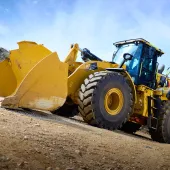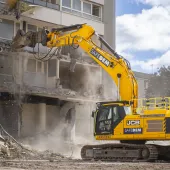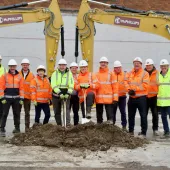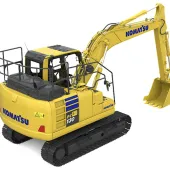The Compact Way To Operate

John Vardy, at Finning, discusses the rise in demand for compact plant equipment and the options available to quarry managers
The quarrying industry makes a major contribution to the UK’s economy. With an annual turnover of £3 billion and employment figures reaching nearly 20,000 people, quarrying is an important player in the UK market economy, and it is therefore vital that the industry continues to move forward and develop new and safer ways of working to stay competitive in an ever-demanding market place.
The growing popularity of compact plant within quarrying can partially be explained by the availability and reliability of equipment coming into the market over the past few years. However, there are also real cost benefits to be gained in some applications by using smaller equipment rather than more traditional means. Relying on larger plant for certain tasks can increase the operational costs of a site dramatically. Not only does it cost more in fuel usage, but it also reduces the productivity of the operators, as larger machines are generally not designed for use in smaller tasks or within difficult and confined applications.
Finally, current health and safety regulations state that individuals should not attempt to lift heavy items in excess of 20kg and that handling aids should be used wherever possible. While the role of quarry workers will remain an integral part of the quarrying process, one way site managers are addressing such health and safety issues is by turning to machinery for more effective and safe quarrying methods.
What are the options?
In today’s quarrying environment, the duty of carrying out some of the more dangerous operations around the site, including heavy lifting, has been passed on to compact plant equipment such as mini-excavators and skid-steer loaders. Such equipment has become standard at many quarries across the UK — both sand and gravel and hard rock sites — playing an integral role in the day-to-day operations and carrying out the housekeeping tasks that help ensure the site runs efficiently and safely.
The skid-steer loader, for instance, is considered by many as the ‘the Swiss army knife’ of the quarry and construction sector. Capable of conducting menial tasks such as sweeping, the skid-steer is also well suited to tougher duties such as landscaping and shifting light loads. The machines are used regularly across sites to help ensure that larger mobile plant equipment maintains productivity and remains at full working capacity.
The Caterpillar skid-steer family of equipment offers all the features and benefits that quarry managers would expect from a world-class manufacturer. The operator station provides a high level of working comfort and visibility, with enhanced fingertip control and optimum instrumentation. The ergonomic pilot hydraulic controls give operators precision control of the machine with minimal effort, and long hours in the cab are made easier by many standard conveniences.
At the heart of the Cat skid-steer loader power train is the Caterpillar 3024C diesel engine, a rugged, reliable, four-cylinder engine which offers aggressive performance and a fast torque curve for quick response.
Other machines within the compact fleet range include the telehandler and the compact wheel loader. The latter is often used within small batching plants for the filling of bins and other housekeeping tasks. However, the machine can also be fitted with a fork for carrying pallets, or even a motorized brush for sweeping yard areas. The mini-excavator can handle similar tasks but has the additional potential advantage of being used for the unblocking of crushers, something that has traditionally been carried out by individuals and has more recently been included within the health and safety guidelines from the HSE.
The telehandler offers a high level of versatility and performance, much like the skid-steer loader, making it a useful item of equipment for the quarrying sector. This machine originally entered the quarrying environment as a replacement for the scissor-lift and has now almost completely taken its place. Designed for easy operation and manoeuvrability, the telehandler is suitable for any tidying tasks around the site as well as maintenance duties. The multi-purpose vehicle is also often used for access at height as well as for reducing the number of manual-handling tasks on site.
Finning’s range of compact plant equipment has been specifically designed to meet and exceed health and safety regulations. The Cat telehandler range, for example, has a number of attachments available including man baskets for the safe transport of individuals for work at height. This attachment is classified as a ‘non-integrated working platform’, allowing people to work at height but with the lifting motion being controlled by the machine operator.
Not only is the telehandler popular within the quarrying environment, it is also more broadly favoured within the construction industry, specifically for maintenance and production duties. In the quarry sector it can also be used for the loading of sand and gravel into heavy goods vehicles.
Designed for ease of operation, the Cat TH210, for example, allows the operator to work productively and comfortably within an enclosed cab designed to protect the operator from roll over and falling objects.
The cab layout has been ergonomically designed to make the operator’s job as easy as possible. The controls are logical, highly responsive and easy to reach, with the instrument panel being comprehensive and clear. The machine’s low-profile design, side-mounted engine and low boom pivot point allow the operator to carry loads in a low position without obstructing visibility to the right of the machine, while the compact dimensions of the TH210 offer good manoeuvrability on site. With its low-profile and 3m (9ft 10in) outside turning radius, it can work productively in confined areas.
Overall, the use of compact plant equipment adds to the operational effectiveness of a quarry, but also helps a site become a much safer working environment. Ensuring a safe work site is now a legislative requirement, and there are costly consequences for those companies that are found negligent. Compact plant equipment, however, is not only helping site managers to meet their HSE duties, but is also providing cost-effective solutions in terms of machinery expenditure.
Finning experts will work with clients to ensure compact plant equipment is specified to meet the needs of each individual site throughout the purchasing process. The company also understand that an effective maintenance programme for a customer’s fleet of equipment is essential to prevent machine downtime. This issue is just as important for smaller compact equipment as it is for larger machines as an essential part of day-to-day activity on site. A programme of servicing can be integrated into the working programme of an operational fleet, ensuring repair work is scheduled and machine uptime maintained.








